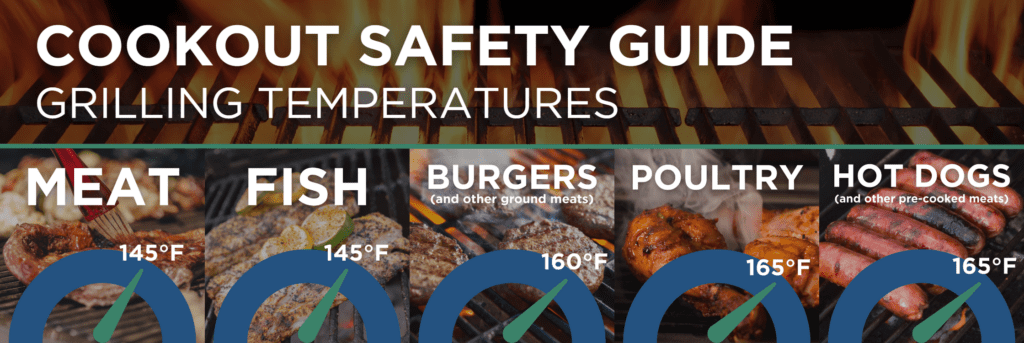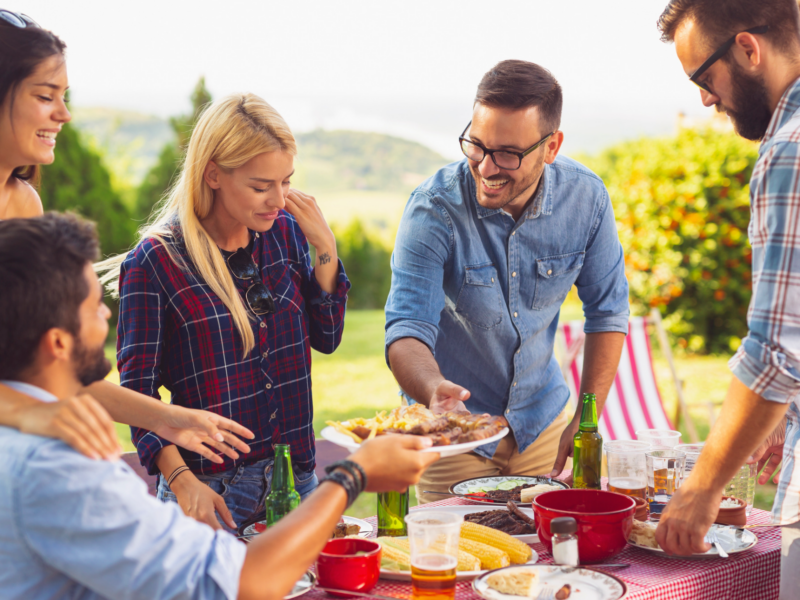Quer esteja preparando um jantar para a família, reunindo-se com amigos em um parque local ou dando uma festa ao ar livre, todos adoram um bom churrasco! Mas antes de colocar os hambúrgueres e os cachorros na grelha, é importante priorizar uma experiência segura para você e seus convidados.
De doenças transmitidas por alimentos a acidentes com grelhados, é importante planejar com antecedência para manter todos seguros. Continue lendo para aprender dicas importantes de preparação de alimentos e segurança na churrasqueira para organizar seu churrasco e evitar lesões ou oneroso reclamações de seguros.
A PREPARAÇÃO ADEQUADA É FUNDAMENTAL
Quando se trata de segurança alimentar, a preparação é fundamental para garantir que você e seus convidados se divirtam muito sem ficarem doentes.
Comece lavando as mãos.
Em uma pesquisa de 2018Em um estudo realizado pelo USDA, constatou-se que 97% dos consumidores não lavam as mãos adequadamente ao manusear alimentos.
O O CDC aconselha molhar as mãos e ensaboá-las bem com sabão. Ao lavar, ensaboe os dois lados das mãos, bem como entre os dedos e sob as unhas. Em seguida, esfregue as mãos por pelo menos 20 segundos. Uma boa regra geral é esfregar o tempo suficiente para cantar "Parabéns a você" até o fim duas vezes. Em seguida, enxágue e seque as mãos.
Manusear produtos cárneos com segurança.
Sempre siga as instruções de segurança alimentar do CDC diretrizes para manusear carnes, aves e frutos do mar antes mesmo de chegarem à grelha.
- Ao fazer compras, compre carnes, aves ou frutos do mar por último, logo antes de pagar.
- Separe-o dos outros alimentos imediatamente e mantenha cada embalagem em seu próprio saco plástico.
- Mantenha-o refrigerado, mesmo enquanto estiver marinando.
- Certifique-se de lavar as mãos antes e depois de manusear produtos de carne crua.
- Evite a contaminação cruzada, certificando-se de que a carne crua, os sucos ou as mãos não lavadas não entrem em contato com outros utensílios, produtos alimentícios ou superfícies.
- Quando terminar de cozinhar, lave todas as superfícies de trabalho e utensílios
MANTENHA-O SEGURO ENQUANTO ESTIVER COZINHANDO
Grelhar é mais do que preparar hambúrgueres exatamente como todo mundo gosta - os alimentos também precisam ser cozidos adequadamente. (Não se preocupe, ele não precisa ter gosto de papelão para ser seguro!)
A maneira mais fácil de garantir que seus hambúrgueres, bifes, peixes ou outros produtos de carne sejam seguros para consumo é usar um termômetro de carne para monitorar a temperatura interna. Siga sempre a Diretrizes de segurança alimentar do CDC para cozinhar seus produtos de carne e frutos do mar na temperatura adequada.


- Carne: Cortes inteiros de carne bovina, suína, de cordeiro e de vitela devem ser cozidos a 145°F e deixados descansar por 3 minutos antes de serem cortados ou consumidos
- Frutos do mar: Peixes e mariscos devem ser cozidos a 145°F ou até que a carne esteja opaca e se separe facilmente com um garfo
- Hambúrgueres: Hambúrgueres e outras carnes moídas devem ser cozidos a 160°F
- Aves: Frango, pernas de peru e outros produtos de aves devem ser cozidos a 165°F
- Cachorros-quentes: Cachorros-quentes e outros produtos de carne pré-cozidos devem ser cozidos a 165°F
Após o cozimento, mantenha os alimentos quentes (pelo menos 140°F) para evitar o crescimento de bactérias e doenças transmitidas por alimentos.
O USDA diz que, se você usar um defumador, o processo será muito mais lento. Use um termômetro para monitorar a temperatura. O calor precisa ficar entre 225 e 300° F durante o cozimento. Quando a carne estiver pronta, ela deve atingir a mesma temperatura interna de quando foi grelhada.
ONDE HÁ UMA GRELHA, HÁ UM FOGO
Grelhas, fumantes e churrasqueiras estão por trás de mais de 11.000 incêndios domésticos todos os anos, sendo que mais da metade desses incêndios em grelhas ocorre de maio a agosto.
Siga estas dicas de segurança para churrasqueiras e mantenha seu churrasco livre de incêndios:
- Mantenha a churrasqueira longe da casa, de grades, galhos e somente use-os em ambientes externos.
- Remova o acúmulo de graxa e gordura de usos anteriores para evitar incêndios.
- Mantenha seus convidados longe da churrasqueira enquanto ela estiver funcionando, especialmente as crianças.
- Nunca deixe a churrasqueira funcionando sem supervisão.
| DICAS DE SEGURANÇA PARA CHURRASQUEIRAS A GÁS | DICAS DE SEGURANÇA PARA CHURRASQUEIRAS A CARVÃO |
|---|---|
| Verifique se há vazamentos ou outros problemas na mangueira antes de ligar o motor para a temporada | Use apenas o fluido de partida para carvão vegetal; nunca adicione outros líquidos inflamáveis ao fogo |
| Sempre abra a tampa antes de acender | Quando terminar, deixe as brasas esfriarem completamente antes de jogá-las fora |
| Se sentir cheiro de gás durante o cozimento, afaste-se da churrasqueira e chame o corpo de bombeiros imediatamente | Descarte as brasas em um recipiente de metal, pois o carvão pode permanecer ativo e reacender por vários dias |
Grelhas e defumadores mal conservados ou sujos são acidentes que podem acontecer. De acordo com a National Fire Protection Association (Associação Nacional de Proteção contra Incêndios), vazamentos ou rupturas estão por trás de 9% de incêndios em estruturas de churrasqueiras a gás e 15% de incêndios em churrasqueiras a gás externas. Inspecione sua churrasqueira Verifique regularmente se as mangueiras estão em boas condições e devidamente conectadas e sempre verifique se a churrasqueira está limpa antes de ligá-la.
LESÕES RELACIONADAS À FUMAÇA E AO FOGO
O Associação Nacional de Proteção contra Incêndios diz que mais de 22.000 pacientes vão ao pronto-socorro todos os anos devido a ferimentos envolvendo churrasqueiras, mas os incêndios não são a única causa de queimaduras.
A temperatura da superfície da grelha geralmente começa em meados de 200 graus e pode chegar a 500 graus, portanto, certifique-se de manter seus convidados longe da grelha enquanto ela estiver funcionando para evitar lesões.
Gasolina e fluido de isqueiro são outra causa comum de lesões, especialmente quando se trata de churrasqueiras a carvão. Para reduzir o riscoSe a churrasqueira estiver fria, é uma boa ideia adicionar fluido de isqueiro antes de ligar a churrasqueira. Manter as pessoas longe da churrasqueira e esperar até que ela esfrie completamente pode ajudar a evitar queimaduras durante o churrasco.
Se alguém sofrer uma queimadura leve, coloque a parte lesionada do corpo sob água fria e corrente para reduzir o inchaço. Não aplique gelo nem estoure as bolhas. No caso de queimaduras mais graves, remova a roupa ao redor da queimadura, cubra-a com um pano limpo e ligue para o 911.
>> O QUE FAZER IMEDIATAMENTE APÓS UM INCÊNDIO
A inalação de fumaça é outro risco em potencial, principalmente para a pessoa que está cozinhando. Cuidados completos recomenda grelhar com a tampa aberta para que a fumaça não se acumule embaixo e saia quando for aberta.
RISCOS DE SEGURANÇA DOMÉSTICA DURANTE UMA FESTA
Quando se trata de segurança em churrascos, sua mente provavelmente não vai direto para a segurança doméstica. Você deixa as portas destrancadas e permite que seus convidados entrem e saiam quando faz um churrasco no quintal? Se sim, talvez você queira pensar duas vezes.
Você provavelmente já sabe que organizar uma festa dá muito trabalho, mas sabia que essa distração pode permitir que os invasores passem despercebidos enquanto você está no quintal entretendo seus convidados? Algumas dicas para reduzir esse risco:
- Peça a seus convidados que telefonem ao chegar para que você possa manter as portas fechadas e trancadas
- Arme seu sistema de segurança (se você tiver um)
- Configure um sistema de vigilância por vídeo para acompanhar quem está entrando em sua casa
OPÇÕES SAUDÁVEIS DE ALIMENTOS GRELHADOS
Pode ser apenas uma questão de segurança alimentar, mas se você quiser fazer um churrasco com um pouco mais de nutrição e um pouco menos de gordura, aqui estão algumas ideias:
- Experimente grelhar frutas e legumes. Você já grelhou abacaxi? Que tal colocar algumas espigas de milho descascadas diretamente na grelha e girá-las para que fiquem carbonizadas? Tenha cuidado para não cozinhá-los demais, mas grelhar frutas e legumes pode realmente realçar o sabor, além de ser uma opção mais saudável.
- Escolha a carne certa e cozinhe menos: Se você escolher proteínas mais magras, elas serão mais saudáveis e menos propensas a causar inflamações na grelha. Cortar a carne em pedaços menores e espetá-la em espetinhos com legumes também contribui para uma refeição mais saudável.
FOI FERIDO EM UM CHURRASCO?
Esperamos que essas dicas de segurança para churrascos sejam úteis ao planejar sua próxima reunião ao ar livre. Se você ou alguém que você conhece se feriu em um churrasco, clique aqui para obter mais informações sobre os advogados de lesões do Keches Law Group.





